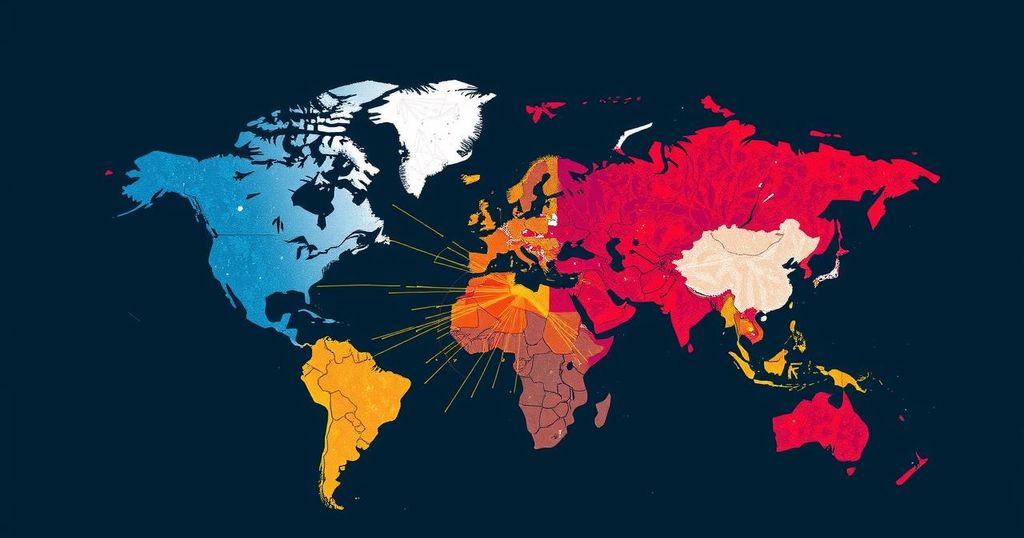The Impact of White-Wing Politics on the Upcoming U.S. Elections and the Global Stage

The U.S. presidential election on November 5 poses significant implications for both domestic policy and international relations. Candidates Kamala Harris and Donald Trump showcase extreme political views, stirring concerns about future U.S. foreign policy, immigration strategies, and environmental commitments. Both candidates appear unlikely to shift the course toward greater humanitarian engagement or global cooperation, raising alarms about the potential for increased extremism and conflict.
The upcoming U.S. presidential elections, set for November 5, have been characterized as one of the most significant electoral contests in a generation. Yet, observers question whether the importance of these elections is fully realized, especially amid ongoing domestic and global concerns that accompany the political campaigns of the leading candidates. With the Vice President Kamala Harris, representing the ruling Democratic Party, and the former President Donald Trump, from the far-right Republican Party, both candidates are tied to controversial positions that may exacerbate existing global tensions. As over 160 million Americans prepare to cast their votes, the global implications of this election loom large. Prominent regimes in North America and Europe are closely monitoring the outcome, as it will likely shape public sentiment and policy pathways. However, skepticism arises regarding whether either Harris or Trump offers genuinely contrasting visions for America’s role on the world stage. Both candidates have adopted extreme nationalist perspectives, particularly regarding foreign interventions and international law. Harris has conversed about ceasing violence in regions such as Gaza and Lebanon while simultaneously committing to continued military support for Israel, which critics accuse of engaging in war crimes. Delivering on humanitarian rhetoric has been equated to mere political posturing without substantive policy shifts. Meanwhile, Trump’s alignment with apocalyptic Christian nationalist sentiments heavily influences his foreign policy stance, particularly in relation to Israel. The refusal of both candidates to acknowledge international legal opinions on the Israeli occupation further indicates a troubling disregard for global humanitarian standards. Their stances on immigration reflect a broader trend of xenophobia, as both candidates favor stricter immigration policies despite America’s historical identity as a nation built by immigrants. Moreover, despite global calls for greater environmental responsibility, their campaigns have accelerated support for fossil fuel extraction practices, including fracking, which have significant implications for climate change. This irony of presenting America as a leader in environmental discourse, while simultaneously neglecting international accords on climate action, raises considerable concerns. Analysts are understandably alarmed at the prevailing cultural and political sentiments that may be reinforced by the election results, portending a further entrenchment of extreme white-wing ideologies and political polarization. This election could renew regional conflicts and amplify environmental degradation in the Caucasian bloc, with potential global repercussions. The outcome of the 2023 presidential elections may not only dictate the U.S. domestic agenda but also reshape international relations in profound and troubling ways.
The context surrounding the United States presidential elections invokes significant concern on both a national and global scale. With the sheer scale of political and social dynamics at play, the candidates’ positions on critical issues such as foreign policy, immigration, and environmental stewardship are of paramount importance. Particular scrutiny is directed toward the support of current administrations for certain foreign nations, raising questions about adherence to international law and humanitarian principles. The polarization between extreme political factions within the U.S. is also mirrored in policy proposals, further reinforcing division both domestically and within the broader international community.
In summary, the forthcoming U.S. presidential election stands as a pivotal moment fraught with potential consequences for both national and global governance. The extreme political narratives presented by both leading candidates reflect a worrying trend towards nationalism that could undermine humanitarian efforts internationally. With their positions on foreign policy, immigration, and environmental issues drawing significant critique, decision-makers must consider not just the implications of election results but also the trajectory they set for global relations for years to come.
Original Source: www.aljazeera.com








